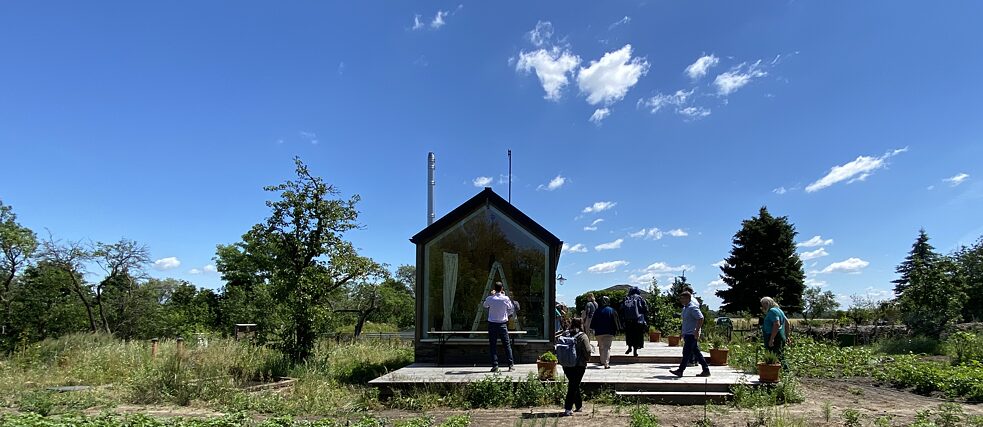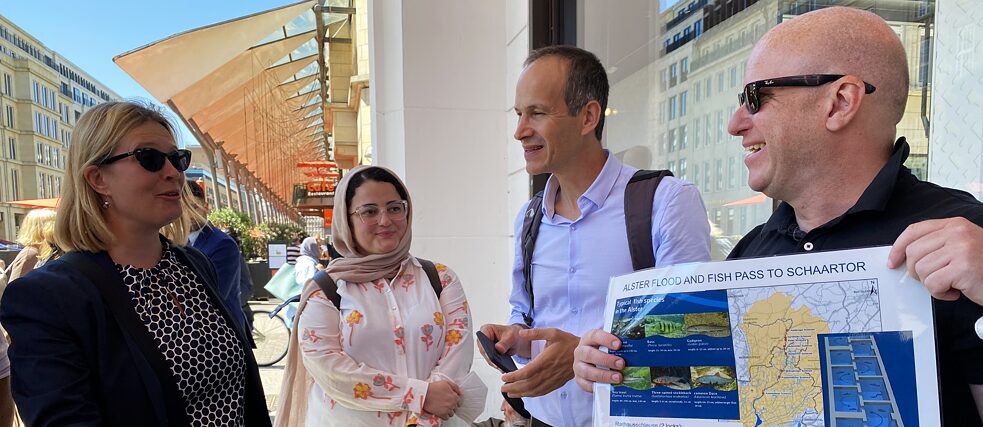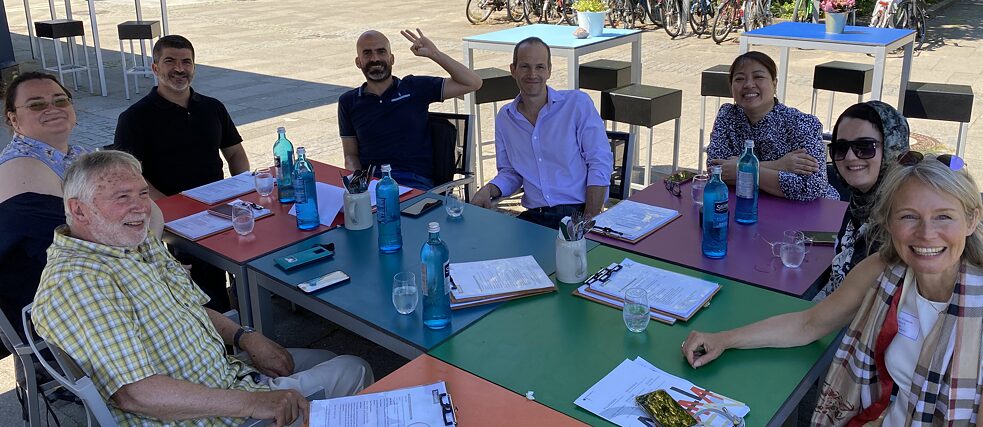Constructive Climate Anxiety
Worldwide
Climate experts from eight countries gathered information during a thematic tour of Germany on international climate policy, and exchanged ideas and experience.
 The SPREEAKADEMIE’s tiny house – a model house for building and living sustainably in rural areas | © Goethe-Institut e.V.
The SPREEAKADEMIE’s tiny house – a model house for building and living sustainably in rural areas | © Goethe-Institut e.V.
The question is, “Where do we stand and what can we do? Where can we start?” That’s how young environmental activist Bakhshin Taha Fatih sums up the situation in Iraq. A country very hard hit by the impact of climate change, yet where there is little awareness of climate protection, either among the public or on the part of the government. Rachel Herrera of the Climate Change Commission in the Philippines and Carlos Serra, who heads an environmental education institution in Mozambique, concurred that, regrettably, the situation was very similar in their countries.
“We need very specific suggestions,” says Bakhshin Taha Fatih, an urgent request addressed to the German experts in a round of discussions on the question of how to achieve climate neutrality by 2050. Together, the German and international climate experts gathered ideas and examples of projects that could work in Iraq, the Philippines or Mozambique. Investment in photovoltaics, for example projects in schools or hospitals with support from foundations for pilot projects.
 Visit to a flood defence structure with Jan-Moritz Müller of the State Office for Roads, Bridges and Inland Waterways of the City of Hamburg | © Goethe-Institut | © Goethe-Institut e.V.
Visit to a flood defence structure with Jan-Moritz Müller of the State Office for Roads, Bridges and Inland Waterways of the City of Hamburg | © Goethe-Institut | © Goethe-Institut e.V.
The varied programme shed light on various aspects of the topic of “Climate Policy for 2050.” How does the Potsdam Institute for Climate Impact Research deal with unforeseeable events, such as the pandemic or the Ukraine crisis? What will the houses and cities of the future be like and what contribution can the Climate Service Center Germany’s advisory toolkits make in this area? How does the SPREEAKADEMIE in Lausitz address sceptical communities on site in the field of environmental education? The variety of themes discussed corresponds to the mixed backgrounds of the group of guests taking part - they included representatives of ministries, foundations and think tanks alongside environmental activists.
The programme is very balanced, says Annamari Arrakoski-Enghardt, head of a Finnish foundation for the protection of the Baltic Sea, with events ranging from a scientific and political overview at the start of the week and a field visit to the Lausitz, a region in transformation, to applied science with a thematic focus on flood protection in Hamburg and Schleswig-Holstein. This last item on the itinerary was the one closest to her heart, of course, but the other programme items, and particularly the exchange of views with the other guests and the German discussion partners, were invaluable for her work. It was becoming clear, particularly in climate policy, how interlinked the many individual aspects are.
 The international climate experts talking with Professor Horst Sterr, who organised a round of discussions on the subject of coastal protection for the group at the University of Kiel | © Goethe-Institut e.V.
The international climate experts talking with Professor Horst Sterr, who organised a round of discussions on the subject of coastal protection for the group at the University of Kiel | © Goethe-Institut e.V.
Many big questions were raised during this tour. Answers to them can only be found by joining forces in international exchange. Learning together and from one another, exchanging views and experience and networking, while also experiencing German culture and even getting to know quite a few different cities and regions at the same time was a very special distinctive feature of the tour, adding great value in comparison with other formats such as international conferences.
Themed tour “Climate Policy for 2050,” on invitation by the German Federal Foreign Office
Cities Visited: Berlin, Potsdam, Raddusch / Spreewald, Hamburg, Kiel
Period of travel: June 2022
 The SPREEAKADEMIE’s tiny house – a model house for building and living sustainably in rural areas | © Goethe-Institut e.V.
The SPREEAKADEMIE’s tiny house – a model house for building and living sustainably in rural areas | © Goethe-Institut e.V.
The question is, “Where do we stand and what can we do? Where can we start?” That’s how young environmental activist Bakhshin Taha Fatih sums up the situation in Iraq. A country very hard hit by the impact of climate change, yet where there is little awareness of climate protection, either among the public or on the part of the government. Rachel Herrera of the Climate Change Commission in the Philippines and Carlos Serra, who heads an environmental education institution in Mozambique, concurred that, regrettably, the situation was very similar in their countries.
“We need very specific suggestions,” says Bakhshin Taha Fatih, an urgent request addressed to the German experts in a round of discussions on the question of how to achieve climate neutrality by 2050. Together, the German and international climate experts gathered ideas and examples of projects that could work in Iraq, the Philippines or Mozambique. Investment in photovoltaics, for example projects in schools or hospitals with support from foundations for pilot projects.
 Visit to a flood defence structure with Jan-Moritz Müller of the State Office for Roads, Bridges and Inland Waterways of the City of Hamburg | © Goethe-Institut | © Goethe-Institut e.V.
Visit to a flood defence structure with Jan-Moritz Müller of the State Office for Roads, Bridges and Inland Waterways of the City of Hamburg | © Goethe-Institut | © Goethe-Institut e.V.
From a sustainable tiny house in the Spree Forest to coastal protection in Hamburg
Since 2020, the international climate experts have met online three times (due to the pandemic) to discuss topics in different focal areas. The digital formats were organised by the Visitors Programme on behalf of the Federal Foreign Office. In June 2022, it was finally possible for the one-week tour of Germany that had been planned for two years to take place.The varied programme shed light on various aspects of the topic of “Climate Policy for 2050.” How does the Potsdam Institute for Climate Impact Research deal with unforeseeable events, such as the pandemic or the Ukraine crisis? What will the houses and cities of the future be like and what contribution can the Climate Service Center Germany’s advisory toolkits make in this area? How does the SPREEAKADEMIE in Lausitz address sceptical communities on site in the field of environmental education? The variety of themes discussed corresponds to the mixed backgrounds of the group of guests taking part - they included representatives of ministries, foundations and think tanks alongside environmental activists.
The programme is very balanced, says Annamari Arrakoski-Enghardt, head of a Finnish foundation for the protection of the Baltic Sea, with events ranging from a scientific and political overview at the start of the week and a field visit to the Lausitz, a region in transformation, to applied science with a thematic focus on flood protection in Hamburg and Schleswig-Holstein. This last item on the itinerary was the one closest to her heart, of course, but the other programme items, and particularly the exchange of views with the other guests and the German discussion partners, were invaluable for her work. It was becoming clear, particularly in climate policy, how interlinked the many individual aspects are.
 The international climate experts talking with Professor Horst Sterr, who organised a round of discussions on the subject of coastal protection for the group at the University of Kiel | © Goethe-Institut e.V.
The international climate experts talking with Professor Horst Sterr, who organised a round of discussions on the subject of coastal protection for the group at the University of Kiel | © Goethe-Institut e.V.
“Let us communicate positively”
The question that keeps cropping up is how to communicate the measures that are needed to achieve the climate goals. “Let’s communicate positively and tell success stories!” is how Juan Fernando Lara, a journalist from Costa Rica, sums it up. Much has been done In Germany in the last 30 years and Germany is a model for climate protection technologies in many areas. The international climate experts agreed that Germany should continue to play a trailblazing role - this is a decisive and immensely important Impetus for their countries’ governments. At the end of the week, Bakhshin Taha Fathi from Kurdistan, Iraq reported that she now had “constructive climate anxiety”. Iraq was very hard hit by the impact of climate change, but she saw that countries such as Germany want to do something about it. That gives her hope.Many big questions were raised during this tour. Answers to them can only be found by joining forces in international exchange. Learning together and from one another, exchanging views and experience and networking, while also experiencing German culture and even getting to know quite a few different cities and regions at the same time was a very special distinctive feature of the tour, adding great value in comparison with other formats such as international conferences.
Themed tour “Climate Policy for 2050,” on invitation by the German Federal Foreign Office
Cities Visited: Berlin, Potsdam, Raddusch / Spreewald, Hamburg, Kiel
Period of travel: June 2022